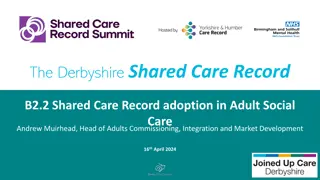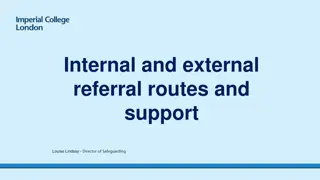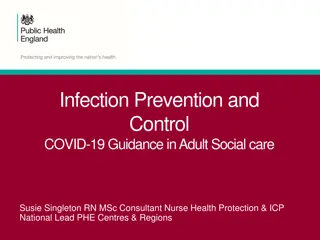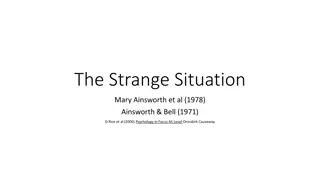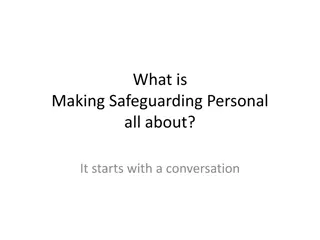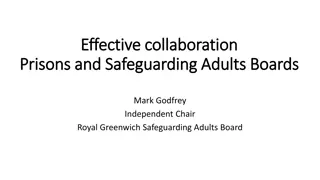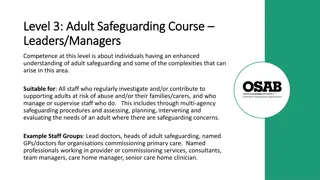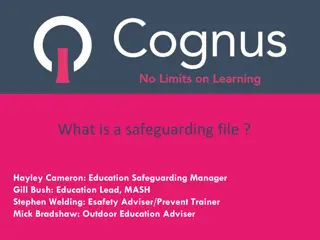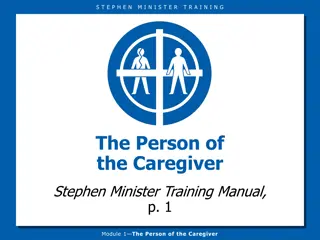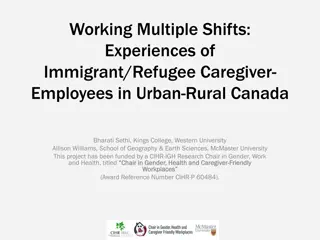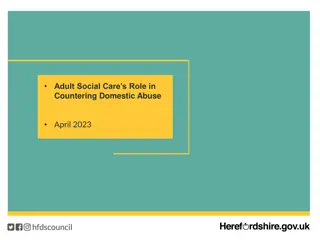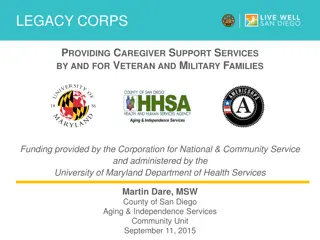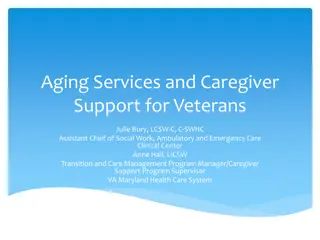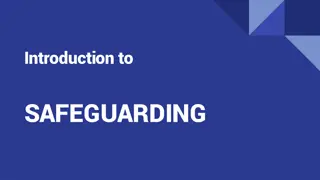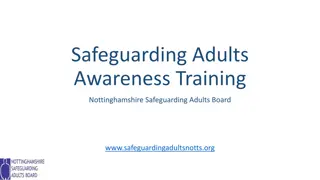Understanding Caregiver Safety and Safeguarding in Adult Social Care
This content explores various aspects of caregiver safety and safeguarding in adult social care settings. It covers the carer experience, factors that may make someone feel unsafe, risks of harm to the person being cared for, solutions to unintentional harm, barriers to seeking help, and the importance of early intervention and self-care for caregivers.
Download Presentation

Please find below an Image/Link to download the presentation.
The content on the website is provided AS IS for your information and personal use only. It may not be sold, licensed, or shared on other websites without obtaining consent from the author. Download presentation by click this link. If you encounter any issues during the download, it is possible that the publisher has removed the file from their server.
E N D
Presentation Transcript
Carers safety and Safeguarding Marie Smith- Adult Social Care Heather Roach- Safeguarding Adults Board
The carer experience Physical and mental health Stress Sleep Where to go for information Isolation Knowledge on how to manage particular conditions
what may make someone feel unsafe?
You are worried someone might hurt you on purpose or by accident Someone is physically aggressive to you health deteriorating Someone is verbally aggressive to you Controlling behaviour Unwanted sexual behaviour You are worried you might harm the person you look after You feel pressurised into doing more than you are able to OR you want to. Not letting in help for you
What may increase the risk of someone harming the person they look after?
Harming someone you care for. Increase in frustration and tensions Feeling angry at the person you look after. Physical or verbal aggression Relationship changes Flashpoints in the day.
Solutions to manage care can cause unintentional care Locking someone in a car while you shop Not giving someone so many drinks in the evening Locking someone in a house or room to keep them safe Giving more than usual sedative medication to get some rest Using bed rails to prevent someone getting out of bed.
You are the carer! What might stop you from asking for help? What do you need from professionals?
Break See you in 5!
Planning and staying safe- Get help early, stay health and well. Would the person benefit form understand more about a specific condition? Encourage people to look after their own mental and physical health. Does the person being looked after need additional care? Safety planning
If things reach a crisis Getting support with the day to day care for the person you care for. Norfolk County Council 0344 800 8020 Getting mental health support for you or the person you care for Encourage the person to contact their GP if you they have concerns about their mental health or the mental health of the person they look after. GP out of hours- call 111 option 2 You can refer yourself to The Wellbeing service on 0300 123 1503 or online at Mental health emergency. 0344 800 8020.
Carers Matter Norfolk 0344 800 8020 Your caring role, what you do and how it impacts on your physical mental wellbeing. How caring impacts elements of your daily life If you wish to continue caring. What would help to improve wellbeing Support networks Working and leisure opportunities How they would like their life to be.
When should someone speak to the police? If they feel frightened of the person they are caring for. If they have hurt them physically If they threaten then, including with a weapon If they feel they are being co-erced or controlled If they do not feel safe If they can not leave the person to get away from danger What will the police do? Police can calm a situation down They will understand if the person has care and support needs. Police can only make arrests if a crime has been committed or to protect people Police may contact other agencies that can help
When should someone call Norfolk County Council ? When a carer feels their safety is at risk. If you think someone may hurt the person they are looking after A care Act assessment is required. Occupational Therapy equipment or support. Assistive technology sensory impairment. Carers Matter Norfolk In an emergency call 999
Norfolk Integrated Domestic Abuse service Partnership with Leeway, the Daisy Program, Leeway and Safe Partnership. It has ben commissioned by the Office of the Police and Crime Commissioner for Norfolk They will ask about the risks, and work with an individual and their family to enhance their safety. They will ensure the person is supported in the most appropriate way.
Demonstrate Norfolk Safeguarding adults website 12 minute Briefings Safety Leaflet.
In your groups discuss what your organisation can do to support the safety and the people they care for. Identify a pledge that you back to your organisation
Key Key points to take away Identify Identify people who look after others Understand Understand the pressures of the Caring role and the complexity of domestic abuse. Offer Offer support early Ask Ask questions Offer Offer information and advice of where to get help.


